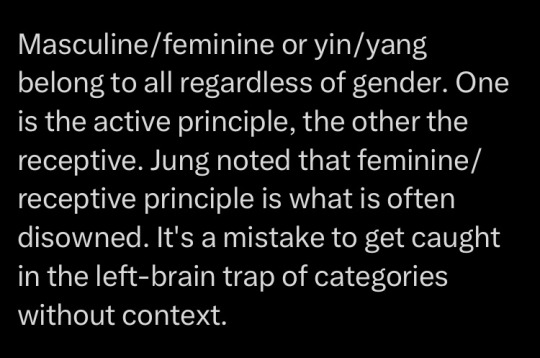#animus anima
Text
Happy birthday Japanese actress Eihi Shiina! Here's some Audition art to mark the occasion!

#happy birthday#eihi shiina#japanese actress#audition 1999#audition#odishon#tokyo gore police#helldrivee#vampire girl vs frankenstein#meatball machine#the ninja war of torakage#sky high#open house#animus anima#horror art#horror movies#art#horror film#horror#body horror#cult classic#cult film#cult movies#the last drive in with joe bob briggs#the last drive in#movie art#drawing#movie history#pop art#the black scorpion
1 note
·
View note
Text
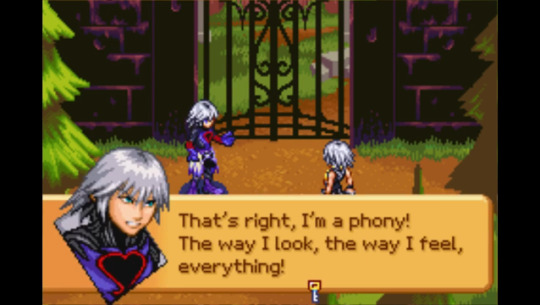
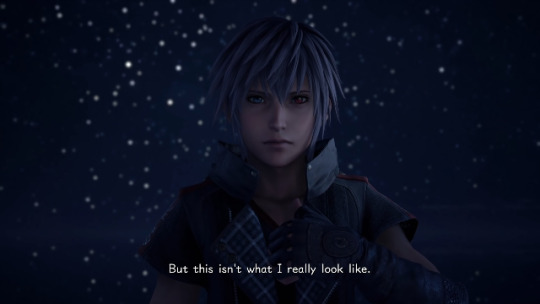
"If an individual has wrestled seriously and long enough with the anima (or animus) problem, so that he, or she, is no longer partially identified with it, the unconscious again changes its dominant character and appears in a new symbolic form representing the Self, the innermost nucleus of the personality. In the case of a man, it manifests itself as a masculine initiator and guardian." ― Marie-Louise von Franz
#repliku was like a prototype of this before the anima (kairi) and animus (ansem sod) issue was resolved#kingdom hearts#kh repliku#kh yozora#repliku#replica riku#yozora#guilty unconscious duo#daybreak nightfall duo#soriku#kh meta
40 notes
·
View notes
Text
"The inner feminine (anima) within every man is his archetypal Venus. The inner masculine within every woman (animus) is her archetypal Mars.
"Men are from Mars, Women are From Venus". Venus is our capacity for human embrace, gentleness, patience, love, and sacrifice.
Mars is our capacity for goal-setting, courage, ambition, aggression, and willfull assertion.
We can evaluate one's connection or disconnection with these inner states based on the birth chart conditions of Venus and Mars.
A man who is born with Mars in the 12th House or aspects between the Moon and Mars may feel more inclined to his Feminine and as though he cannot live up to the demands of the Masculine. While a woman who is born with aspects between Venus and Saturn may harbour a resentment toward her inner Feminine and project this onto women in general."
66 notes
·
View notes
Text
"A man thinks the difficulty is that he doesn't understand the woman; no, he doesn't understand himself."
— Carl Jung, Zarathustra Seminar
Read further . . .
55 notes
·
View notes
Text
Syzygy, or Animus and Anima: Weiss and Jaune
Anima-Animus anon, here is your meta. I genuinely do think Weiss and Jaune are one of the best literary examples I've seen of animus and anima, respectively. This is not inherently a shipping meta, although you could read it that way.
Of note: I did talk about Jaune and anima before here in a larger meta about his arc, and about Weiss and animus here. But I want to talk about their arcs because they are complimentary, and really encapsulate how to write anima and animus pretty perfectly.
So let's go over it. What is anima? What is animus? How is Jaune one of Weiss's animuses? How is Weiss one of Jaune's anima? And what does this mean thematically for their arcs and the work of RWBY as a whole?
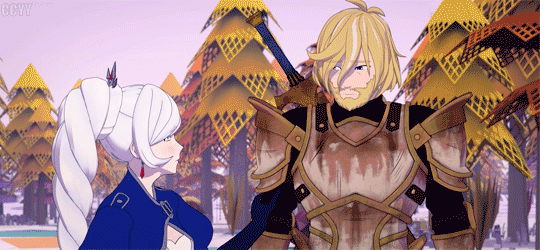
Jungian Archetypes
I have a whole meta on Jungian archetypes in RWBY. But I just want to quickly go over some of them because I'll use these terms in the meta.
Persona: the part of ourself we present to the public. It's usually somewhat fake, or at least societally acceptable.
Shadow: the part ourselves we repress because we do not want to acknowledge the parts of us that are selfish, hurting, weak. End goal: integration with the shadow and accepting that these are parts of you. In literature, the shadow is often negative or antagonistic if embodied in a character, because facing it requires facing character flaws. However, only by integrating with the shadow do we start to heal. It's necessary to become a complete person. Associated with the Black stage in alchemy, and with Blake.
Anima/animus: the feminine/masculine within ourselves. This can overlap with the shadow in some ways (for example, men often don't want to admit that they're weak). Anima/animus can be positive and negative. Associated with the White stage in alchemy, and with Weiss and Jaune. You don't have to interpret it as romantic, but it often is.
Self: The Self is the end goal of Jungian psychology: achieving individuation, or the fullness of being who you are and knowing your role in the world. Associated with the Red stage in alchemy, and with Ruby.
Syzygy: the union of anima and animus.
Lastly, I want to disclaimer about the terms "masculine" and "feminine" here. Jung was writing at a time when gender binaries and roles were very much a thing. Of course they apply less today (and RWBY deliberately plays with some of these, as we'll see). But when I use the term "masculine" or "feminine" in this meta I mean in the traditional sense Jung is talking about. Masculine=bravery, physical power, fear of the weak. Feminine=beauty, emotions, kindness, etc. Please note this is clearly oversimplified and I am not endorsing this, just explaining a pattern that Jung pointed out in regards to literature.
Jaune and Anima
Between anima and animus, anima is more likely to be romantic in fiction. That's because Jung associated anima with something he called Eros (Greek for romantic/sexual love). A man's anima is also almost always one person at a time. This is not the case with animus, as we'll see.
Hence, the two women associated with Jaune's anima are Weiss and Pyrrha.
The previous meta I did on Jaune's arc makes a strong argument that Pyrrha firstly embodies his anima. She almost perfectly goes through the first three of four stages of anima in regards to how Jaune views her, which are:
Eve (mother)
Helen (romantic interest)
Mary (religious devotion)
Sophia (wisdom, guide to the inner life)
I would also argue that Pyrrha embodies Sophia too here, but the living Sophia is also Weiss. Sophia is Greek for "wisdom," and both the official RWBY Twitter account and the show itself make the connection explicit for us, with the Curious Cat calling Weiss "wise Huntress."
But it's also deeper than just stages here. Jaune's entire arc is about the rejection of toxic masculinity and the embrace of his own role as maiden. Only through becoming a Maiden (in other words, embracing the feminine within) can he become a Knight (the man he was meant to be).
Jaune As The Maid of Orleans
Jaune's allusion is, of course, Jeanne d'Arc. He has a feminine allusion, which tells us to expect his integration with the inner feminine. Joan of Arc was also know as three things:
A spiritual guide to France in wartime
A soldier/knight
A maiden
In real life, Joan of Arc was dismissed because she was just a girl... until she started actually winning battles and her predictions came true. God or not, there's something really powerful and intriguing and eerie about her story. Joan of Arc referred to herself as "Jeanne la Pucelle," or "Joan the Maiden."
But what is a Maiden? In Joan's time, it literally meant "virginity," because there was a prophecy that France would be restored by a virgin. In other words, her virginity was a strength--spiritually, at the time period, her going to war with men yet maintaining her virginity was seen as a sign of righteousness (yes, it was very anti-sex).
In RWBY, a maiden is also hardly a weakness. No, a Maiden is a specific type of power.
It's also associated with martyrdom.
Jaune has had special relationships with several of the Maidens in the series: firstly, Pyrrha, who chooses to kiss him (a nice pro-sex commentary honestly) before dying as a Maiden even though the power had not been transferred to her. Pyrrha ends up a martyr like Joan of Arc, but her legacy, like Joan's lives on. Pyrrha embodies what Jaune should become.

Penny, of course, dies as a martyr too. She is stabbed by Cinder and there isn't time to save her. Jaune, who defines himself as a healer thanks to his semblance, has no choice but to kill her so that Penny stays in control of her destiny. It's tragic, but like Pyrrha, it isn't empty.
Of course, Cinder has now killed Jaune's first love interest, tried to kill another (Weiss), and then made Jaune into a killer via stabbing Penny. Hence, Jaune and Cinder are also linked, and the message of what a maiden should be, and what destiny is--the message Pyrrha carried, the message of choice embodying destiny that Penny carried--is something I suspect Jaune will give to Cinder before the end.
Still, all of these incidents, the three big alchemical deaths of the series--Black Death, White Death, and Yellow Death (Crocea Mors)--involve Jaune and specifically switch the gender of what you would expect from a hero.
The Knight is supposed to protect the Maiden. Instead, the Maiden kisses Jaune and locks him away to save him while she fights Cinder. Jaune is supposed to protect the Maiden, but she (Weiss) gets impaled precisely because he couldn't get over his previous failure to save Pyrrha. This time, though, he saves Weiss.
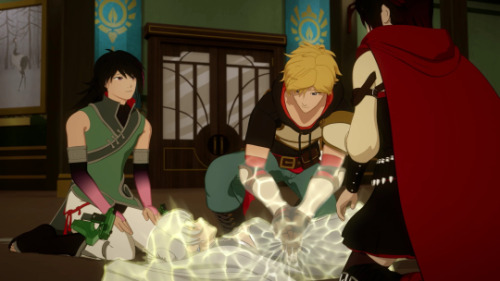
The thing is, though, that healing is traditionally a feminine attribute. Hence, Weiss lives and Jaune heals because, symbolically, of his ability to embrace the inner feminine.
Lastly, the Knight is supposed to save the Maiden. But instead, saving the Maiden looks like becoming the monster himself, like becoming his shadow (which Cinder is). It shatters his sense of self, as we've been seeing throughout Volume 9.
If a Knight is also a dragon killing a maiden, who is he?
Jaune As The Rusted Knight
Jaune's sword is broken, and he intensely clings to this persona of "knight who saves" the entire volume. But by intensively insisting on saving the Paper Pleasers, he doesn't realize he's repeating what Ironwood et al did to Penny: refusing to allow them their own right to choose their destiny. He also fails to save Alyx.
Jaune's "knight who saves" persona has been a key part of his character since the first season. He cheats to get into Beacon because he wants to be a hero and carry on his family's legacy. He's embarrassed to be so weak, but the only way to become strong is to rely on women. Team RWBY, Pyrrha, even Nora and Ren (who don't fit gender stereotypes themselves).
Pyrrha literally trains Jaune. Notably, whenever Jaune relies on male advice, he fails. In fact, his knight persona is precisely why Weiss doesn't like him at first (not just romantically; like, at all.)
Weiss: (separating the two) Jaune, is it? Do you have any idea who you're talking to?
Jaune: Not in the slightest, snow angel.
Jaune: I don't understand. My dad said all women look for is confidence! Where did I go wrong? (accepts Ruby's offered hand and uses her to lift himself back up)
Yang: "Snow Angel" probably wasn't the best start.
Jaune's confidence and understanding of women coming from his dad instead of like, actual women, means he's going to make an arse of himself. And he does. At first.
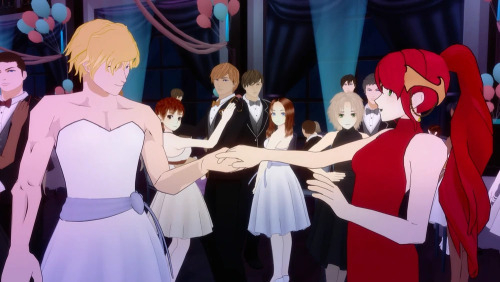
But, Jaune starts to integrate with the feminine through not just Pyrrha training him physically, but also through doing things like dressing up as a princess and going to the dance like that to honor his word to Pyrrha. He gets closer to Weiss by talking to Neptune about feelings rather than by impressing her through feats of strength. He then saves her life via delving into a traditionally feminine power. And in the end of Volume 9, he is restored to his young self via Alyx, the girl he thought he couldn't save.
Weiss and Animus
Oh boy, animus.
Okay, so... Jung did not write nearly as much about animus as he did about anima. Supposedly that's because he's a dude and recognized that he could not actually experience animus. Fortunately, his wife Emma wrote a lot about it, as did some direct colleagues (like Marie-Louise von Franz) who specifically applied animus to its portrayal in fairy tales.
Animus differs from anima in a few key ways. The centrality of the concept--that it's the masculine within a woman--remains the same. However, animus:
is not usually limited to just one person at a time like anima;
doesn't follow stages nearly so neatly (they exist but are a bit... debatable)
is not inherently based on Eros, or a romantic understanding. No, instead animus is based on Logos.
What is Logos? Logos is literally "word" in Greek, but the actual usage is more akin to "mind" or "spirit." Weiss, of course, is a mind character. It can also refer to the principle of the matter. In other words, a woman looks for her masculine traits in a principle she holds dear.
Jung himself said:
The male personification of the unconscious in the woman — the animus — exhibits both good and bad aspects, as does the anima in man. But the animus does not so often appear in the form of an erotic fantasy or mood [as the anima often does to men]…even in
a woman who is outwardly very feminine the animus can be an equally hard and inexorable power. One may suddenly find oneself up against something in a woman that is obstinate, cold and completely inaccessible.
Weiss as Princess Snow White

Weiss starts off possessed by her negative animus, the Logos or principle.
What is animus/anima possession? It's specifically a negative manifestation of the animus (or anima) wherein someone behaves overwhelmingly like their masculine side--but in a negative sense. In other words, for Weiss, this looks like a persona of toxic masculinity.
Possession caused by the anima or animus presents a different picture... The animus is obstinate, harping on principles, laying down the law, dogmatic, world-reforming, theoretic, word-mongering, argumentative, and domineering.
I kinda do think this sounds like early-volume Weiss. But it also sounds like... Jacques Schnee.
See, the animus is also often a reflection of a woman's father. Even though Weiss is determined to prove herself without her father's influence by the start of the series, we also see that she is in some ways behaving like him. Of course she's not nearly so ruthless or bigoted, but she does maintain some prejudice about faunus, maintains entitlement (demanding to be leader of RWBY), tells off Ruby for accidents, etc. She's denying her femininity.
But then her development starts, and with this, her animus changes. Who are her animus?
Well, as I said above, animus has multiple presentations, and for Weiss they're specifically unique... because some of them are women. Make of that what you will, shippers and headcanoners. I'm not just going off of nowhere in saying that I think some of Weiss's masculine animuses are women, either; I'm specifically talking about it in regards to Weiss's allusion of Snow White.
You can find numerous fairy tale analyses with animus/anima interpretations. Snow White is one of the most obvious ones. But Weiss's Snow White is genderbent... mostly. Except for her.
See, in the Grimm version of the fairy tale, Snow White's father is alive. He just does absolutely nothing to stop his wife from abusing Snow White. In this story, Willow, Weiss's mother, is the absent one, doing absolutely nothing to stop Jacques from abusing her children. As a result, we have the Shadow develop--in the fairy tale, the Shadow is the Evil Queen. In Weiss's story, it's Jacques. He is who she doesn't want to be, but does have similarities to especially in her persona.
Snow White then meets nine other men. Yes, there are a total of ten male characters, and they are all aspects of animus. In the original Snow White fairy tale (reference this analysis), we can break it down as such:
Absentee dad
Huntsman
Seven Dwarves
Prince
In this, we can see slow progression of Snow White's integration with her masculine side.
Firstly, it's denied to her (she's completely out of balance) because her father refuses to take any action and is never mentioned again.
Secondly, the Huntsman takes action and spares Snow White from the queen, but also doesn't exactly help her. He sends her off into a dangerous forest to fend for herself.

Thirdly, we see reciprocity finally appear. Snow White helps the dwarves, but they also help her. It becomes a mutual relationship in which she learns from all seven of them.
Lastly, Snow White is revived thanks to the prince, who marries her as an equal.
When we compare this to Weiss's arc, we see similarities. Willow is absent, denying her what she needs. Then, Winter play the role of the Huntsman, helping Weiss forge her own way to a degree but still leaving her to rely on herself when she could maybe use a bit more help.
Thirdly, Weiss meets RBYJNPR: her seven dwarves. She learns how to be herself, learns who she is, in great part because of them.
Lastly, this volume we have her developing an attraction to Jaune, whom she knows and who has revived her. She gets to be fully Prince and Princess.
What About Stages?
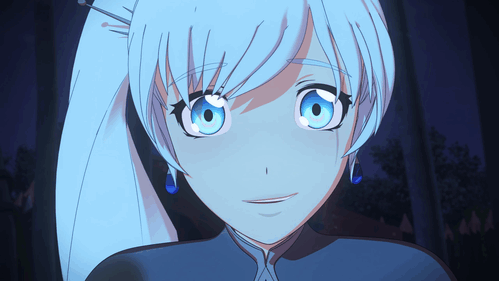
The stages of animus, when they exist, are loosely defined (as in Jung himself didn't actually say this, but is often attributed as having said it) as:
Tarzan: physical power
Byron: man of action or romance
Lloyd George: man as a professor or orator
Hermes/Mercury: man as a spiritual guide
If we look at this through the lens of Weiss's arc, we do see traces of these. The physical power Weiss is attracted to is embodied in Winter and Pyrrha. I mean Weiss specifically calls out Pyrrha's physical strength when she meets her:
Weiss: So, Pyrrha, have you given any thought to whose team you'd like to be on? I'm sure everyone must be eager to unite with such a strong, well-known individual such as yourself!
Weiss: This will be perfect! The smartest girl in class combined with the strongest girl in class! Together we will be unstoppable! I can see it now! We'll be popular! We'll be celebrities! We'll get perfect grades! Nothing can come between us now!
The man of action/romance is embodied in the Rusted Knight persona, and in Neptune, who is notably a giant flirt.
As a professor or orator, I would actually say there are many here. Klein, of course, reminding her who she is. Then there is Robyn, who is probably the most obvious orator in the story. Also Ironwood. Basically, thanks to Robyn having the election stolen from her, Weiss helps take down her dad. As a result, her mother returns to her (the feminine returning) and she is able to get Whitley to help save them all (integrating the masculine).
We also see a little bit of this later on with Jaune, in that Weiss expressly says she admires his maturity.
The technique of coming to terms with the animus is the same in principle as in the case of the anima; only here the woman must learn to criticize and hold her opinions at a distance; not in order to repress them, but, by investigating their origins, to penetrate more deeply into the background, where she will then discover the primordial images, just as the man does in his dealings with the anima.
We're not quite there with Hermes/Mercury, and I would bet that Jaune won't fully become gold or a spiritual guide unless he, well, has something to do with saving Mercury Black. The allusion is too literal not to be used.
Weiss as Knight
Weiss has always been a knight in addition to being Snow White, a maiden princess. Weiss defeats a knight-like creature (Arma Gigas) in the White trailer, and then goes on to be able to summon Arma Gigas as part of her semblance thereafter.
She's exceptionally talented in combat. In fact, the person Jaune calls to save Pyrrha when she's gone to fight Cinder is Weiss. He begs her to save Pyrrha, and Weiss promises him she will.
Sadly, just like Jaune in his attempts to be a knight, she can't, but not for lack of trying.
Later, in Volume 5, we see Weiss receive a power up that comes from her soul (another word for anima). The knight imagery becomes even more part of her semblance, as @aspoonofsugar has written. Notably, she summons Queen Lancer (literally referring to both the maiden-princess and knight archetype) after Jaune heals her in Volume 5. In other words, it's part of her integration with Jaune.

Then, Volume 8 happens, and Jaune again tries to rely on Weiss. He insists to Penny that "Weiss will buy us time" to heal Penny. And she would have tried (and probably died). But Penny tells Jaune that he's the one she needs to do something brave. It's his time to be a knight.
Weiss similarly expresses confidence that Jaune would have done the best he could after she arrives at the Ever After, unaware that he's fallen, too. Even as they go through the Ever After, Weiss affirms her Logos: herself, which is defined by her heroism and her failures.
Weiss: I don't know who you think you are, but let me tell you who I am. I am the granddaughter of a hero and the child of a villain. I am a citizen of a fallen kingdom and an heir to nothing. I will not be defined by my name because I will b e the one to define it. I am Weiss Schnee, and I am a Huntress.
And then we have the finale of Volume 9. Here, Weiss is the one to give Jaune words of wisdom, to encourage him after the Paper Pleasers return as jewels and Jaune realizes that he was not only holding them back, but holding himself back (literally, Jaune, despite being older, has not grown at all emotionally; he's stagnated. He's not a 40 year old in a teen's body; he was a teen in a 40 year old's body). Weiss tells Jaune what she told her younger self:
Jaune: I wanted the rush of rescuing someone, and I got that here.
Weiss: I think you're asking too much of yourself. We've been telling ourselves that failing means we're no good. But I can guarantee even the best Huntsmen in history? They've all lost. But they were still incredibly brave. And good.
In response to this, Jaune starts to cry (a traditionally feminine trait!), and Weiss asserts again what her Logos is: being a knight and a maiden, being brave and good, even when that means you can't save everyone.
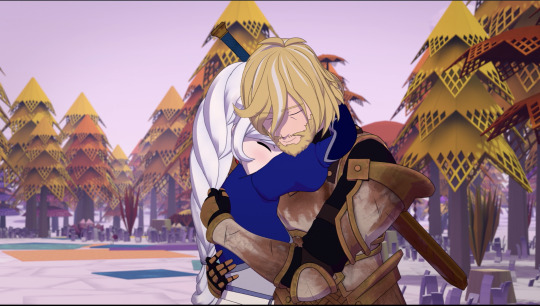
So then they fight together, again.
But it's another reversal. The princess, instead of being saved by the knight, almost kills the knight with fire in a scene that comments on what happened with Pyrrha, Jaune saving Weiss, and Penny.
Integration of Knight and Maiden
What's interesting about the Pyrrha-anima-animus connection is that it is Weiss who introduces Jaune to Pyrrha in the first place. Weiss wants to be Pyrrha's partner, actually. She deeply admires Pyrrha, as shown as she says about her and Pyrrha in that first meeting:
Nothing can come between us now!
What immediately comes between them is Jaune. Literally.
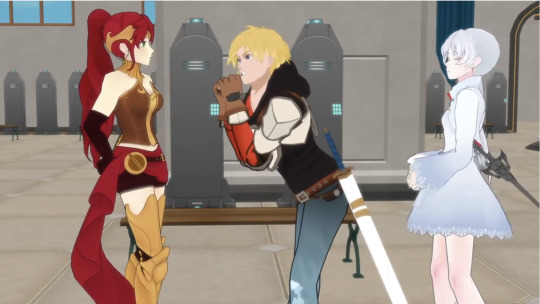
But it's not Jaune coming between them in an icky two girls can't get along because of a boy love triangle way. No, instead it's the three of them united because of their relationships with each other.
In that same scene, the very first, we have Weiss literally asking Pyrrha to intervene and get Jaune away from her by throwing her spear... which she does. The symbolism of Weiss asking Pyrrha to throw her spear into Jaune is uh. It's Freudian. Let's leave it there.
In fact, Jaune's feelings for Pyrrha start to develop as a result of her training him physically and encouraging him about his crush on Weiss. Hence, Weiss has been a part of Jaune and Pyrrha's relationship since the start of it; all three of them have an inextricably intertwined relationship.
Then, when Pyrrha says goodbye to Jaune and kisses him, it's right before shoving Jaune into a locker, the same as the ones she met him in front of. This time, when Jaune's in trouble, he calls Weiss--understanding that he needs someone else to save Pyrrha, and trusting that Weiss can do it. Jaune calls Weiss, because she's a knight. Unfortunately, she can't save her.
In Volume 5, Jaune saves Weiss precisely because his grief over Pyrrha contributes to Cinder impaling Weiss. Pyrrha is central to Weiss and Jaune's bond. Pyrrha and Weiss have always been intertwined as Jaune's anima, and if they do end up going with romantic White Knight, they would never have happened if it weren't for Arkos.
While I often see early-volume!Jaune's feelings for Weiss dismissed as shallow, I don't think they actually are. I think they're immature, sure, but look at what he tells Ren about Weiss:
It's Weiss... I'm completely head over heels for her, and she won't even give me a chance. She's cold, but she's also incredible. She's smart, and graceful, and talented-- I mean have you heard her sing? I just wish she take me seriously, y'know? I wish I could tell her how I feel without messing it all up.
Jaune clearly always did see the actual Weiss, not just her beauty, physical strength, or name. Yes, he was initially attracted to her persona, but the undercurrent was always real. Even Snow Angel.
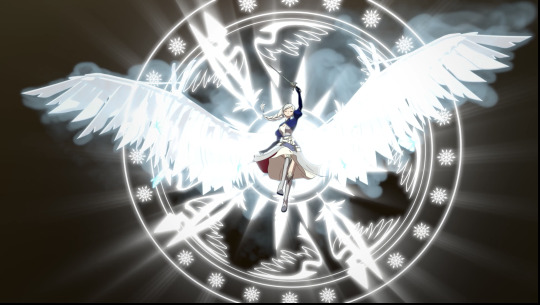
The problem is that Jaune could never be with Weiss if he remained in his Knight persona, expecting her to take the princess role. No, instead, they both have to be knight and princess.
Knight and maiden have never been more clearly integrated than in Volume 9's portrayal of Weiss and Jaune. Jaune is the legendary "Rusted Knight." But, he turns out to still be a Maiden literally waiting around a tower/house for rescue in the form of Team RWBY.

When the Jabberwalker comes, Jaune and Weiss fight together just like Bumbleby fight together; this is explicitly paralleled. (Also, Weiss kind of ignores her fighting partner, Ruby, which contributes to Ruby's feeling lonely; this isn't inherently wrong because they like, needed to stop the Jabberwalker, but it still, well, is, and is also emblematic of Ruby feeling left behind).
During this fight, Jaune tosses his sword to Weiss, who expertly wields it despite it being broken and then gives it back, therefore symbolizing that Weiss can be the knight, that she can be the masculine one, and letting her do so is actually not emasculating for Jaune. Instead, it's realization of his potential in being both knight and maiden.

(And, let's not get into the very very basic Freudian symbolism 101 of a woman using a man's sword.)
The Maiden, instead of being saved by the knight, almost kills the knight with a baptism of fire.

In fact, in Jung's own writing on the philosophical tree (yes, really), he notes this:
The lapis signifies the inner man... the natura abscondita which the alchemists sought to set free. In this sense the Aurora consurgens says that through baptism by fire "man, who before was dead, is made a living soul."
...
The genuineness or in-corruptibility of the stone is proved by the torment of fire and cannot be attained without it. This leitmotiv runs all through alchemy.
What is funny here is that Jung uses "lapis" here to mean the philosophical stone, which is most commonly called a ruby. But it can be a sapphire, or apparently a lapis lazuli. Go google the color lapis and tell me that that is not exactly Weiss's dress color.
Like Joan of Arc, Jaune is consumed by the fire. He is coagulated after the dissolution of the Paper Pleasers. But instead of coming forth as ashes, he comes forth as gold... with some growth still ahead and with some white streaks in his hair, symbolizing integration with the feminine (white=feminine in alchemy and Jung).
So where do Weiss and Jaune go from here? Jung provides a clue:
“Just as the anima becomes, through integration, the Eros of consciousness, so the animus becomes a Logos; and in the same way that the anima gives relationship and relatedness to a man’s consciousness, so the animus gives to a woman’s consciousness a capacity for reflection, deliberation and self-knowledge.”
C.W. Vol 9. Part II: Aion. The Syzygy: Anima and Animus
Both Jaune and Weiss have done this for one another thus far, and will continue doing so. Neither Weiss's nor Jaune's arcs are entirely over, either: Jaune still needs to fully embody the spiritual guide, and Weiss needs to embody wisdom and they are both so close but still have a bit more to grow.
#anima#animus#rwby meta#white knight#weiss schnee#jaune arc#pyrrha nikos#arkos#jung#alchemy#a bit#rwby#rwby volume 9
105 notes
·
View notes
Text
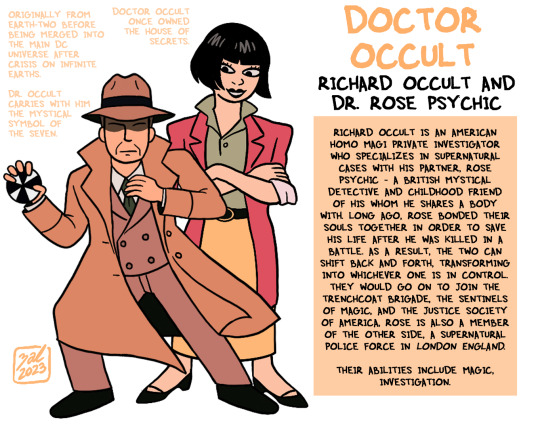
DC characters - Doctor Occult
#doctor occult#dc characters#dc#dc comics#dc heroes#fan art#fanart#justice society of america#earth two#dc multiverse#rose psychic#detective#the sandman universe#dc past#animus#anima
81 notes
·
View notes
Text
Save the date!
Hope you enjoy the all-request stream!!
All songs by request! Yikes
まだ聴ける!サラ・オレイン今���最後のソロ活動
異例の全曲リクエストライブ!
ライブはソールドアウトになり、
配信でぜひご覧下さい!
🎵ご興味がございましたら
【11月21日火曜日】までにお申し込み
𝚂𝚊𝚛𝚊𝚑 À𝚕𝚊𝚒𝚗𝚗「𝟷/𝚏」𝙼𝙴𝙼𝙱𝙴𝚁𝚂 𝚂𝙿𝙴𝙲𝙸𝙰𝙻 𝙻𝙸𝚅𝙴 〜 𝙾𝚗𝚕𝚢 𝙾𝚗𝚎~
■アーカイブ配信期間: 11月25日(土)〜12月1日(金)
詳しくはHPより!

#サラ・オレイン#sarah àlainn#sarah alainn#サラオレイン#サラスタイル#multi instrumentalist#1/f fanclub#your song#animus#anima#ヴァイオリン#アニムス#アニマ#マルチプレイヤー#サラバンド#Sarahband
38 notes
·
View notes
Text
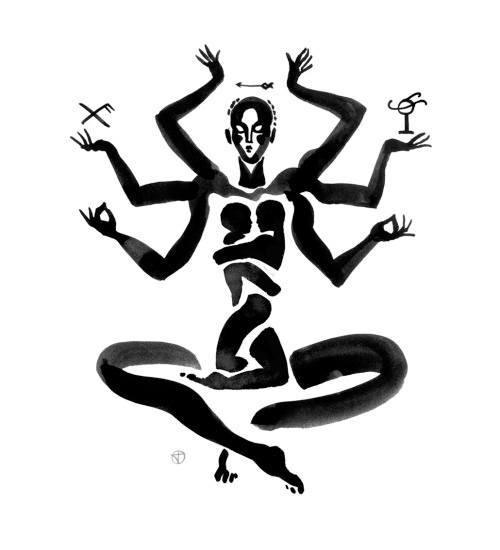
Art: Tomek Sadurski
* * * *
“The outcome of an actual encounter with someone who is a carrier of the anima or animus projection 'frequently gives rise in dreams to the symbol of psychic pregnancy, a symbol that goes back to the primordial image of the hero's birth. The child that is to be born signifies the individuality, which, though present, is not yet conscious.' The real psychic purpose of the conventional man's affair with his very unconventional anima woman is to produce a symbolic child, which represents a union of the opposites in his personality and is therefore a symbol of the self. The meeting with the anima/us represents a connection to the unconscious even deeper than that of the shadow. In the case of the shadow, it is a meeting with the disdained and rejected pieces of the total psyche, the inferior and unwanted qualities. In the meeting with the anima/us, it is a contact with levels of the psyche which has the potential to lead into the deepest and highest (at any rate furthest) reaches that the ego can attain.”
Murray B. Stein (Jung's Map of the Soul: An Introduction)
[Centre of Applied Jungian Studies]
#Tomek Sadurski#Murray B. Stein#Centre of Applied Jungian Studies#anima#animus#dreams#psychology#quotes
9 notes
·
View notes
Text
Just sharing this detailed "Like Crazy" analysis from a SMART Army, i'm capitalising smart for the Army on the back who refuse to listen to what Jimin wants to tell us
It's a 3min10 video so don't hesistate to pause to read if you need to.
65 notes
·
View notes
Text
psychosexual deconstruction of p.types
each p.type has a role function (8th function in mbti) and even though they actually really dislike it, they will try to act like they are competent with it, they don’t suck at it etc. this is a problem in the bedroom. for example estp trying to be funny or entp trying to rail somebody down will just turn them off. why? because:
each p.type has an anima/animus. this is the fourth function in mbti. suggestive or “dual-seeking” in socionics. types “need” this. instinctively.
so how to please enxps? first tell them “OMG, daddy! destroy me!” or something (since they are trying to prove you how se hard they can fuck you at the beginning) but gradually (depending on your communication skills), show them / tell them that you actually like cuddly grindy si sex instead of railing. slow them down, make them relax, take control even (without being bossy about it). so basically, bring them from fake unvalued se to valued and needed si.
therefore, guess what? inxj is the opposite of entp as you have to bring them from fake si to actually valued se! you gotta rail them. you can think this way too: ni doms are so detached and in their own simulation-world, you gotta be impactful to break the matrix. similarly, ne doms are thinking about possibilities how to make love to you but you make them just focus on the experience and chill.
this is fully theory now: but applying the logic to esxps, they should try to do ne shenanigans in the bed? they should suggest a bit “too creative” things trying to impress you? stupid jokes and shit? nicknames and whatever? so one should be like “muhaha you are so funny” first but then gradually bring them from that fake ne to meaninfulness of the experience which is ni. make them connect with you ni deeper? which, infjs and intjs will do perfectly?
and then ixfps trying to analyze the situation and what their partner thinks right now etc. with their ti role? which actually turns them off? so you gotta clearly “TE”ll them, what you think, what you want? so they won’t need to analyze? they are givers after all? they want to give you what you want and the more you like it, the more they like it?
so yeah, apply the logic to the rest. (acknowledge 8th slot, approach carefully, but bring them to 4th slot without being bossy.)
#16 types#socionics#mbti#personality types#jungian typology#enfp#entp#infp#infj#intj#isfp#esfp#estp#anima / animus#role function#suggestive function#dual-seeking function
8 notes
·
View notes
Text
Anima, Animus Chapter 7
Chapter 7: Waking Dream
Fandom: Danny Phantom, Batman
Rating: T
Category: Gen
Words: 5,033
Chapters: 8/13
Characters: Danny Fenton, Jason Todd, Jazz Fenton, Tucker Foley, Sam Manson, Bruce Wayne, Damian Wayne, Other Character Tags to Be Added, Clockwork (Danny Phantom), Gotham City, Original Antagonist Character(s), Tim Drake, Stephanie Brown
Relationships: Danny Fenton & Jason Todd
Additional Tags: Danny Fenton and Jason Todd are siblings, Long Lost/Secret Relatives, sharing dreams, Jason Todd is Red Hood, Danny Fenton Needs A Hug, Adopted Danny Fenton, Blood and Gore, Genius Loci, Child Neglect, The Fentons’ A+ Parenting, Canon-typical Violence
Chapter Summary: Red Hood was expecting to meet up with the Bats to talk about the plan for dealing with the evil spirit haunting Gotham. He wasn't expecting to run into a kid he's only ever seen in his nightmares.
(AO3 Link)
24 notes
·
View notes
Audio
74 notes
·
View notes
Photo
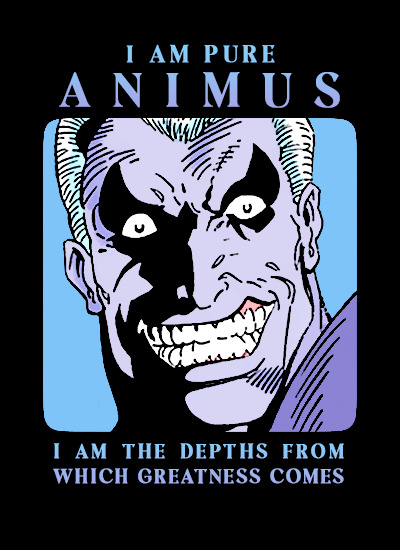





★ The Magus in The Infinity War
I am truly unique in this or any reality. There is no denying this truth. My dreams are beyond containment.
#adam warlock#adam magus#the magus#cosmic marvel#comicedit#marveledit#adamwarlockedit#this guy sucks. I'm in love with him.#*#ahem 🤓 did you know that in Jungian psychology Animus is the masculine side of a woman and Anima is the feminine side of a man 🤓#what is this a comic book for nerds or something? no way.#wish I could've fit his Nietzsche fangirling into this somehow. ''Nietzsche knew exactly what he was talking about'' lol#I wasn't planning on making this a set but the Goddess one I made a while back turned out pretty cute so... Warlock is next of course.#hopefully this actually shows up in tags and doesn't break I had to really fight the tumblr post editor for some reason 😐
41 notes
·
View notes
Link
13 notes
·
View notes
Text
Funniest bit of becoming an expert on jungian analytical psychology for the meme (skimming a couple wikipedia pages) was that his concept of the persona amounts to "you need to unmask enough that you have an actual individual sense of self and aren't just numbly doing whatever's socially expected of you. But don't, like, completely unmask. Keep some mask. So you aren't A Freak"
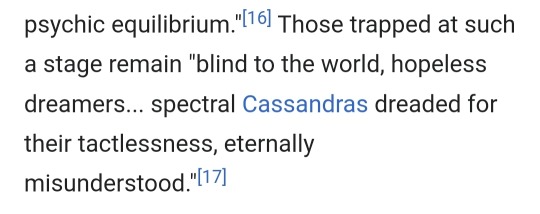
Is he, you know. Blind to the world, a hopeless dreamer. a spectral Cassandra dreaded for his tactlessness and eternally misunderstood
#also loved the 'get in touch with your masculine/feminine side. but not like. too in touch'#[note at top of anima/animus wikipedia page] this article is missing: any modern interpretations or sources
14 notes
·
View notes
